
by Ecoziva (Brazil) | Jul 2, 2014 | 2014, Brazil, Nature, World Motherhood
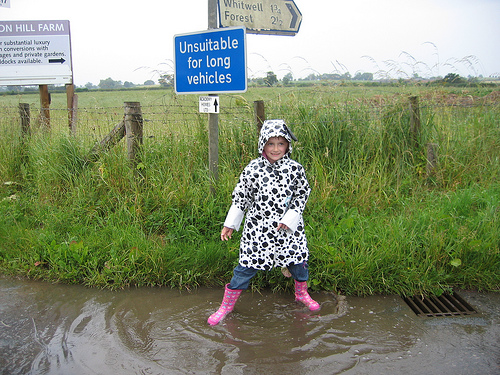
If you happen to walk by my house around 6 a.m., you will most probably encounter me in my pajamas, a jacket and my hair on end, being pulled towards the street with surprising strength by my 15 month old son (who – unlike myself – will be looking quite adorable with his hair on end!). My three year old girl will be fast asleep for another half hour or so and, if it is a weekday, my nine year old and my husband will have already left for school/work .
If permitted, my toddler (and all three of my children, for that matter) would probably live outside 24/7. However, we are currently entering winter – a.k.a. the rainy season and also my least favorite time of the year.
Don’t take me wrong. If I could spend the day curled up in my warm bed reading, it might even be my favorite season! In practice, this is what happens:
First of all, no matter how many times the repairmen come to straighten up the roof, the cats will manage to part the tiles again, especially over our bed (think cold water dripping on your leg suddenly at 2 a.m.!). Also, fleeing the rain, huge ants make nests and leave their very succulent eggs in anything left untouched for more than three days, lest we wrap it in plastic. Plus, the floor is always humid, and everything sticks to it. Last but not least: it is so hard to get out of bed at 5 a.m. and so chilly!
Outside of the home, traffic becomes ten times worse than it already is, everyone is late for everything (and even if they aren’t, the rain will be an excuse for it). The streets fill up with water, cars stop functioning and trash floats. The city is astonishingly unprepared for rain considering the fact that it has had to deal with the sort of weather for over four centuries.
And the kids still want to be outside all the time. Of course, that it great. Kids should be outside, preferably in more natural environments, as much as possible.
Among other benefits, being outside fosters a healthy connection with nature and promotes environmentally responsible behavior in adulthood.
The other day the rain had stopped, and I took advantage of some moments of sun to go out front. I got the kids all prepared in jackets, pants and tennis shoes and thought we could take a relatively “unmessy”, dry walk on our unpaved dirt road (LOL!). Of course in a few minutes they were playing in a puddle. There was mud not only on their clothes, but in their hair, their face and most everywhere. I relaxed and surrendered to their joy.
Witnessing such joy is what gives me the strength – as a current frazzled mother of three – to endure the sometimes overwhelming amount of soaked shoes, mud-soiled clothes and dirt covered floors!
I also find it somewhat amusing how bothered people here in the tropics get when they see kids out in such weather. Especially nwhen I recall the period we lived in Quebec – during what was reportedly one of the toughest winters ever – and how, regardless, parents and children had fun outside in the snowy, below zero weather.
On that same mud-covered day, one woman turned her neck 180° as she drove by and gave me a stern look that said “They’re going to catch cold you irresponsible mother!”
A person working in a construction nearby advised me never ever to let them play in street puddles again because “animals die in the streets”. To top it, a neighbor (who at most has said “good morning” to us in the ten years we have lived here) stopped, announced formally that he is a Veterinary Doctor, and gave me a complete list of all maladies they could catch from that malignant puddle, including leptospirosis , bubonic plague, toxoplasmosis and several others. Of course it didn’t help when I tried to tell him that, despite being a biologist and knowing the risks, I also believed playing in puddles helped them boost their immune systems!
I know, deep down, everyone means well in their advice. Yet, I still prefer to follow the guidance of Mother Nature and allow my kids to be outdoors as much as possible, in any weather!
Do you encourage your kids to go out in all weather? What season are you in now?
This is an original post to World Moms Blog by Ecoziva in Brazil.
Eco, from the greek oikos means home; Ziva has many meanings and roots, including Hebrew (brilliance, light), Slovenian (goddess of life) and Sanskrit (blessing). In Brazil, where EcoZiva has lived for most of her life, giving birth is often termed “giving the light”; thus, she thought, a mother is “home to light” during the nine months of pregnancy, and so the penname EcoZiva came to be for World Moms Blog.
Born in the USA in a multi-ethnic extended family, EcoZiva is married and the mother of two boys (aged 12 and three) and a five-year-old girl and a three yearboy. She is trained as a biologist and presently an university researcher/professor, but also a volunteer at the local environmental movement.
More Posts

by Cindy Levin | Jul 1, 2014 | 2014, Economy, World Bank, World Interviews, World Voice
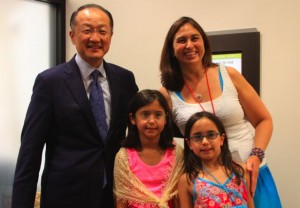
What is the World Bank and what does it do? If you ask an average American, you’ll likely get a blank stare or a wild guess. “Is it like when we played Monopoly as kids and one person got to hand out all the money?” quipped Mackenzie Astin on Vox Populi Radio recently when host Sean Astin tried to explain it to him. “It’s probably where all the countries keep their money,” said my 8-year-old to her sister. Whatever the answer, you’ll usually not hear “they fight poverty” as a first guess, but that’s exactly the key to what an everyday person should know about the World Bank.
While attending the 2014 RESULTS International Conference in June, my daughters and I had a chance to meet World Bank President Dr. Jim Yong Kim moments before he took the stage for an interview in front of hundreds of RESULTS volunteer activists who work every day to end poverty. While we awaited his arrival, I had time to reflect on the role of this man and the World Bank on what kind of world my kids will inherit from my generation.
The World Bank is a United Nations financial institution that provides loans to developing countries. Yet it’s not a bank in the ordinary sense. It’s a partnership that exists to reduce poverty and support development of impoverished nations. Imagine that…a bank with a mission to fight poverty! It provides low-interest loans, interest-free credits, and grants to developing countries to fund programs like education, health, agriculture, and environmental resource management. Where does the money come from? Donor countries, banks, multilateral institutions, and private sector investors all contribute to this vital source of financial and technical assistance to developing countries around the world.
Dr. Kim’s audience cheered wildly that day, holding signs saying “We love the World Bank” because they knew he was going to re-assert the World Bank’s mission end extreme poverty by the year 2030. In fact, the World Bank has set two goals for the world to achieve in that time:
1. End extreme poverty by decreasing the percentage of people living on less than $1.25 a day to no more than 3%
2. Promote shared prosperity by fostering the income growth of the bottom 40% for every country
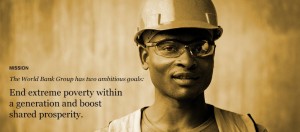
Wow. That’s only 14 years from now. In 2030, my 10-year-old will be 26 years old. Is it possible that in their adulthood, my children could live in a world without extreme poverty? Will they actually have to explain to their children what it was like when millions of people struggled to live on less than $1.25 a day because that kind of suffering won’t be found on the news?
Dr. Kim spoke of his belief that we should focus on the moral imperative to end poverty and shoot for big goals even before we precisely know how to get there. He said our attitude should be “balancing between moral reasoning and the humility that we may not have everything together…but going for it anyway because it’s the right thing to do.” Helping to save lives and educate children is a goal in itself. Plus, evidence for economic benefit of poverty elimination has now caught up with the ethics. For instance, 24% of economic growth is due to better health outcomes. We also now have evidence to show that education is not just nice to have…it’s necessary for growth. So, we should not be afraid to set the incredible goal and then work backward and say, “To achieve our goal, what kind of organization do we need to be to meet that?”
Is Dr. Kim an idealist? Yes, I do think so, but he’s an idealist in the very best way. He has a grand vision of what is possible coupled with a practical leadership style revealed in his insistence on “results based financing.” He wants the World Bank to focus on impact on the ground rather than getting money. When we can report incredible results like a neo-natal mortality drop in Argentina of 74%, donors witness what is possible and invest more.
The path Dr. Kim describes toward the end of extreme poverty is in no way easy. For one thing, it requires confronting the status quo and our assumptions about what works. We need to ask tough questions of organizations providing services, like, “Are you where the poor people are? Are your clinics convenient for you or for the people in poverty who you serve?” The World Bank has a critical role to measure and release regular data about poverty using sophisticated techniques so that we can make great decisions, inspire more funding, and get great results.
In summary, he concluded for us,
“We are not a hard-hearted organization just focused on increased GDP. We are dedicated to ending poverty and making sure that everyone participates.”
All in all, I feel extremely lucky. I feel lucky that I had a chance to meet a man of such vision. I feel lucky that as an advocate for global health and education in this era, I – personally – have a role in bringing about the end of extreme poverty. But most of all, I feel very hopeful and fortunate that if we work together with leaders like Dr. Kim, my daughters will see the end of extreme poverty within their lifetimes and millions more mothers will see their babies grow to be as strong and healthy as mine.
This is an original post written by Cindy Levin for World Moms Blog.
Cynthia Changyit Levin is a mother, advocate, speaker, and author of the upcoming book “From Changing Diapers to Changing the World: Why Moms Make Great Advocates and How to Get Started.” A rare breed of non-partisan activist who works across a variety of issues, she coaches volunteers of all ages to build productive relationships with members of Congress. She advocated side-by-side with her two children from their toddler to teen years and crafted a new approach to advocacy based upon her strengths as a mother. Cynthia’s writing and work have appeared in The New York Times, The Financial Times, the Washington Post, and many other national and regional publications. She received the 2021 Cameron Duncan Media Award from RESULTS Educational Fund for her citizen journalism on poverty issues. When she’s not changing the world, Cynthia is usually curled up reading sci-fi/fantasy novels or comic books in which someone else is saving the world.
More Posts - Website
Follow Me:


by Susie Newday (Israel) | Jun 30, 2014 | 2014, Death and Dying, Israel, Loss of Child, Susie Newday, World Moms Blog, World Motherhood

I’m writing this with tears streaming down my face. What everyone in Israel has been hoping never to hear, has happened. The three teenage boys who were kidnapped 18 days ago on their way home from school were found dead, buried together.
18 days of heartbreak, of feeling helpless, of hope and of unity. 18 days that have ended with the tragedy that we have all feared. During the past 18 days we saw so many glimpses of goodness and unity and support. 18 agonizing days and it’s so ironic because in Judaism, 18 is synonymous with life. In this case, it’s three lives that were brutally ended.
Tears are pouring freely. There is almost nothing on my Facebook wall this moment except an outpouring of grief and sadness. The whole country is in a state of mourning. From little children who have been following the news and saying psalms daily, to teens, to the elderly. We all have broken hearts and can’t even begin to fathom how Eyal, Gil-Ad and Naftali’s parents’ and families are breathing, let alone coping.
I wonder why there is evil in the world. I wonder how we can live in a world so full of evil and hate. I wonder why it is that so often we don’t see or appreciate all the goodness until something evil or awful happens. Do we need the evil in our world in order to appreciate the goodness? I hope not.
My heart is breaking and I am begging each and every one of you to make this world a better place. Be kind, do good and don’t turn a blind eye to evil.
May the memories of Eyal Yifrach, Gil-Ad Shaar and Naftali Fraenkel be of blessed memory. May they rest in peace and guide us in our quest to make this world a better place.
This is an original post to World Moms Blog by our contributor, Susie Newday in Israel. You can find her on her blog New Day New Lesson.
Photo courtesy of #BringBackOurBoys
Susie Newday is a happily-married American-born Israeli mother of five. She is an oncology nurse, blogger and avid amateur photographer.
Most importantly, Susie is a happily married mother of five amazing kids from age 8-24 and soon to be a mother in law. (Which also makes her a chef, maid, tutor, chauffeur, launderer...) Susie's blog, New Day, New Lesson, is her attempt to help others and herself view the lessons life hands all of us in a positive light. She will also be the first to admit that blogging is great free therapy as well. Susie's hope for the world? Increasing kindness, tolerance and love.
You can also follow her Facebook page New Day, New Lesson where she posts her unique photos with quotes as well as gift ideas.
More Posts - Website
Follow Me:






by Meredith (USA) | Jun 27, 2014 | 2014, Childhood, Family, Home, Kids, Life Lesson, Motherhood, Parenting, Siblings, Toys, USA, World Motherhood, Younger Children
 Summer break is upon us once again. With summer, comes sleeping in, summer vacations, and eating sweet watermelon every day. However, there is something else that sneaks its evil little way into summer as well…. (more…)
Summer break is upon us once again. With summer, comes sleeping in, summer vacations, and eating sweet watermelon every day. However, there is something else that sneaks its evil little way into summer as well…. (more…)
Meredith finds it difficult to tell anyone where she is from exactly! She grew up in several states, but mainly Illinois. She has a Bachelor of Science degree in Elementary Education from the University of Illinois at Champaign/Urbana which is also where she met her husband. She taught kindergarten for seven years before she adopted her son from Guatemala and then gave birth to her daughter two years leter. She moved to Lagos, Nigeria with her husband and two children in July 2009 for her husband's work. She and her family moved back to the U.S.this summer(August 2012) and are adjusting to life back in the U.S. You can read more about her life in Lagos and her adjustment to being back on her blog: We Found Happiness.
More Posts

by Susan Koh | Jun 26, 2014 | 2014, Life Balance, Me-Time, Motherhood, Singapore, Susan Koh, Working Mother, World Motherhood
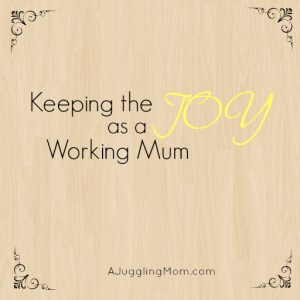
Keeping The Joy
I may be a working mom balancing between family and work, but I’m certainly no super mom. In Singapore, where the population is not reproducing fast enough, our government has gone to great lengths to encourage couples to get married and start a family. And after the ladies have given birth, they are encouraged to return to the work force, as human capital is pretty much our only “resource” in the nation. So like a huge majority of women, I took on a role as a full-time working mom and promptly returned to work after my maternity leave ended after four months.
Unlike most parents who leave their child in the care of their parents or in-laws, my daughter, Sophie, went to infant care at merely four months old. This was after weighing our options very carefully then, as we didn’t live with or near our parents, and we didn’t want to have a live-in helper or nanny. It wasn’t easy initially, and I can’t even remember how many sleepless nights I had when I questioned if I made the right decision to return to work, especially when Sophie fell ill or when I saw her cry when I dropped her off at the childcare center. But today, when I see how Sophie has blossomed to an independent, sociable and sensible pre-schooler, it makes me feel happy that she’s turned out better than what we prayed for and expected.
Being a working mom certainly has its challenges and the one that tops the list for me is not having enough time in a day. So here are some tips on how I manage it without losing my joy.
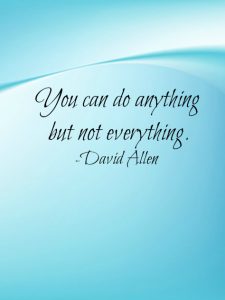
You Can Do Anything
Be fully present
Once I am back from work, I’m 100% devoted to being a mom. I’m thankful that I have supportive bosses and colleagues who understand this, so they never make demands that I have to put in extra hours unless it’s crunch time in the office.
You know what they say about quality time being more important than quantity time? And for working moms it’s so true because, otherwise, we’ll always be beating ourselves up about the lack of time spent with our kids. Screen time is kept to a minimum, so that we spend good quality time together.
And maybe because Sophie is a girl, we enjoy spending time before bedtime sharing how our day went, reading books or even playing games when we feel up to it. But I’ll be totally honest and also say that we do use the TV and iPad as a nanny at times, especially when we have chores to do or when we ourselves just want a mental break on exhausting days.
Train your kids to be independent
With no help at home, Sophie is naturally trained to pick up after herself. When she was younger, we’ll give her little rewards like stickers as an incentive when she keeps her toys, folds the laundry and takes her dishes to the kitchen.
As she gets older, she’s learned that she has a responsibility to help around the house. Of course, I’ll still reward her with praises and appreciation, and she’s come to learn that she needs to do so without expecting anything in return. And these days, she’s on auto pilot-mode and will chip in around the house.
Manage your expectations
I used to strive to do everything perfectly as a mom and had a problem letting go. But when you only have that many hours in a day, I’ve learnt that I need to let go if I want to keep my sanity and my joy. So that means, closing an eye to the unfolded laundry, the times when I can’t cook dinner for the family, the mess at home, and yes, even the dirt at home.
I could get hung up about all these things and stay up late into the night to finish the chores and start the whole routine again the next day, but I know I’ll also feel very miserable and start to loathe it all. So my mantra is simply to do what’s necessary and be happy. After all, as moms, we can do anything but not everything.
Besides, when I get stressed over all the chores, my husband hears no end of complaining and which husband appreciates that? So for him, his mantra is, a happy wife, a happy life.
Schedule me-time
I know it’s crazy to even think that working moms even have any me-time. But it is absolutely crucial to find time for myself to recharge. My me-time can be anything from going for a jog, to having a nice haircut, or even a catch up session with my girlfriends. This year, I’ve started a new hobby, Project Life, and it’s so therapeutic to look back at my life in photos and pen down the memories behind them. Plus, it’s a way of recording life so that nothing slips by and a reminder for me to cherish every moment.
So there you have it – some of my sanity tips for working moms on how to keep your joy. It’s not easy being a working mom, and I know that the person who makes it possible is my dearest hubby who is ever supportive of my decision. He’s every bit the modern husband and daddy in the 21st century who is not afraid to roll up his sleeves to do his part in parenting but also to chip in around the house. And while, he shakes his head when I tell him I still have hopes to be a domestic goddess, I know he’s glad that I’m working to bring in the dough for the family so that we can enjoy our family holidays and have my own shopping money and savings.
Are you a working mom too? If so, what are your top tips to keeping your joy as a working mom?
This is an original post by Susan Koh for World Moms Blog. She’s loves to travel and blogs passionately about parenting, marriage and relationship and leading a healthy life at www.ajugglingmom.com.
Photo credit to the author.
Susan is from Singapore. As a full-time working mom, she's still learning to perfect the art of juggling between career and family while leading a happy and fulfilled life. She can't get by a day without coffee and swears she's no bimbo even though she likes pink and Hello Kitty. She's loves to travel and blogs passionately about parenting, marriage and relationship and leading a healthy life at A Juggling Mom.
More Posts

by Susie Newday (Israel) | Jun 25, 2014 | 2014, Israel, Life Balance, Motherhood, Parenting, Relationships, Susie Newday, World Moms Blog, World Motherhood
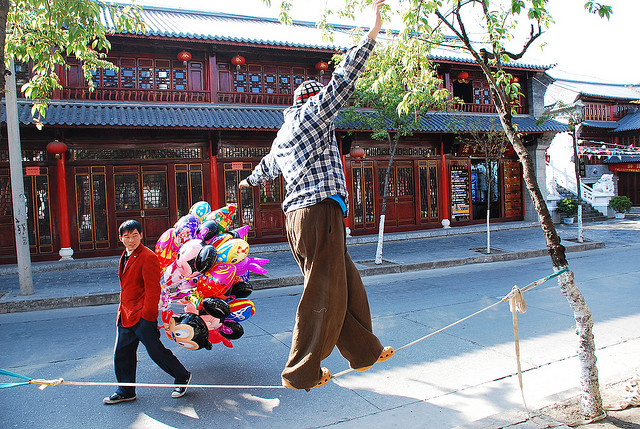
I feel like a tightrope artist struggling to walk the fine line of life.
Not just a lone tightrope artist finding her balance without an audience but one who is trying to navigate in between a myriad of other tightrope artists, each of us attempting not to fall down. Life really is a balancing act, and not just because of all the daily tasks we each have loaded on our plates.
Life is a gentle precarious balance between right and wrong, love and hate, acceptable and unacceptable, pleasure and pain, righteousness and irreverence, wants and needs.
Every single thing we say and do has the potential to hurt someone or to make them feel happy. The potential to be viewed as right or wrong. The potential to be hailed and brilliant or to be regarded as dumb. The tricky part is that you can perceive something or mean something one way and it can be perceived in a totally opposite way.
And when then happens you get blindsided and knocked down, yet somehow you have to find the strength to get back up on that fine line of life and regain your composure and balance. It’s not an easy feat since it can happen quite often and each time you fall or get pushed over, you are left with invisible scars that leave you more afraid and more vulnerable.
I think of all the times I have caused others pain and all the times I have been hurt. I worry about the scars I’m inadvertently inflicting on my children because I’m not skilled enough to stay balanced on that fine line and because I stray from that fine line time and time again. But I’m human and need to learn to forgive myself.
Walking that fine line is scary.
How often do you fall down?
This is an original post to World Moms Blog by our contributor, Susie Newday in Israel. You can find her on her blog New Day New Lesson.
Photo Credit: Tauno Tõhk / 陶诺 ? Flickr Creative Commons
Susie Newday is a happily-married American-born Israeli mother of five. She is an oncology nurse, blogger and avid amateur photographer.
Most importantly, Susie is a happily married mother of five amazing kids from age 8-24 and soon to be a mother in law. (Which also makes her a chef, maid, tutor, chauffeur, launderer...) Susie's blog, New Day, New Lesson, is her attempt to help others and herself view the lessons life hands all of us in a positive light. She will also be the first to admit that blogging is great free therapy as well. Susie's hope for the world? Increasing kindness, tolerance and love.
You can also follow her Facebook page New Day, New Lesson where she posts her unique photos with quotes as well as gift ideas.
More Posts - Website
Follow Me:



















 Summer break is upon us once again. With summer, comes sleeping in, summer vacations, and eating sweet watermelon every day. However, there is something else that sneaks its evil little way into summer as well….
Summer break is upon us once again. With summer, comes sleeping in, summer vacations, and eating sweet watermelon every day. However, there is something else that sneaks its evil little way into summer as well…. 







